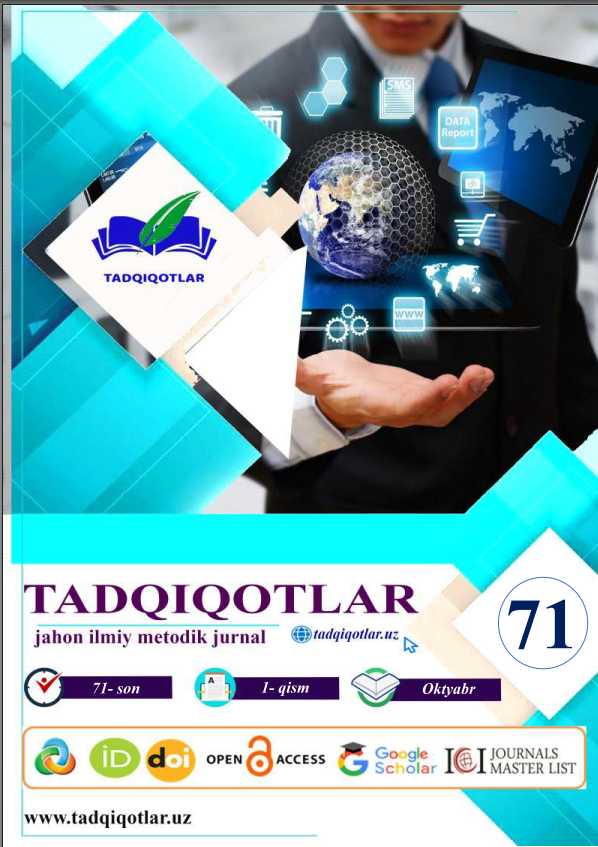THE USE OF APHORISMS IN THE EDUCATIONAL PROCESS: THEIR ROLE IN ENHANCING TEACHING AND LEARNING
Keywords:
Keywords: Aphorism, education, pedagogy, teaching methods, moral development, cultural values, Uzbek proverbs, English aphorisms, motivation, classroom practice.Abstract
Annotation:This article explores the role of aphorisms in the educational
process, focusing on their pedagogical significance and cultural value. Aphorisms are
examined as concise forms of wisdom that not only enrich classroom instruction but
also foster critical thinking and moral development among learners. The study
highlights how aphorisms from Uzbek and English traditions reflect universal human
values while preserving cultural identity. It further emphasizes the potential of
aphorisms to motivate students, stimulate discussion, and connect theoretical
knowledge with real-life experiences. The article argues that incorporating aphorisms
into teaching can enhance both intellectual growth and ethical education, making them
a valuable resource for modern pedagogy.
References
References:
1. Abdullaev, A. (2019). O‘zbek maqollari va hikmatlari. Toshkent: O‘zbekiston
Milliy Ensiklopediyasi.
2. Ahmedova, N. (2020). Cultural values in Uzbek proverbs. Journal of Uzbek
Literature Studies, 12(3), 45–56.
3. Alisher Navoi. (1983). Mukammal asarlar to‘plami (Vol. 7). Toshkent: Fan.
4. Aliyev, S. (2018). The concept of motherhood in Eastern literature. Central Asian
Review, 6(2), 101–112.
5. Azizova, M. (2021). Comparative analysis of Uzbek and English aphorisms.
Philology International Journal, 9(4), 23–34.
6. Barbour, R. (2014). Proverbs as pedagogical tools in cross-cultural education.
Education and Culture Journal, 5(2), 77–89.
7. Crystal, D. (2008). A Dictionary of Linguistics and Phonetics. Oxford: Blackwell.
8. Dundes, A. (1997). The motif of the mother in folklore. Journal of Folklore
Research, 34(1), 3–25.
9. G‘afurov, A. (2017). O‘zbek xalq maqollari. Toshkent: Sharq.
10. Halliday, M. A. K. (2004). Language and Context. London: Continuum.
11. Harrison, R. (2015). The universal value of maternal love in literature. Comparative
Literature Review, 14(2), 67–79.
12. Johnson, M. (2019). Motherhood and symbolism in English proverbs. Journal of
Cultural Semantics, 18(1), 55–70.
13. Karimov, U. (2022). O‘zbek tilida aforizmlar. Toshkent: Nodir Nashr.
14. Lakoff, G., & Johnson, M. (2003). Metaphors We Live By. Chicago: University of
Chicago Press.
15. Qodirova, Z. (2016). Proverbs as reflection of national mentality. Journal of
Philological Research, 10(3), 88–95.
16. Saidov, B. (2014). O‘zbek adabiyotida ona timsoli. Toshkent: Yozuvchi.
17. Smith, J. (2012). Proverbs and Aphorisms of English Literature. Cambridge:
Cambridge University Press.
18. Spencer, H. (2018). Symbolic meaning of motherhood in Shakespeare’s works.
English Studies Journal, 22(2), 144–158.
19. Tursunov, U. (2015). O‘zbek xalq og‘zaki ijodi. Toshkent: Universitet nashriyoti.
20. Wierzbicka, A. (1992). Semantics, Culture, and Cognition. Oxford: Oxford
University Press.
21. Yusupova, L. (2020). Aphorisms as cultural heritage: A case study of mother-
related sayings. International Journal of Linguistic Studies, 11(2), 29–41.
22. Zohidov, K. (2021). The pedagogical significance of proverbs and sayings in
Uzbekistan. Education Research Journal, 7(1), 22–35.
23. Thomas, L. (2017). The use of aphorisms in English classrooms. Modern Teaching
Methods Journal, 15(3), 98–110.
24. Rahimov, J. (2019). Didaktik materiallarda maqollar va aforizmlar. Toshkent: Fan
va Texnologiya.
25. Peterson, C. (2016). Wisdom in aphorisms: Educational and psychological
perspectives. Journal of Applied Pedagogy, 19(4), 201–215.

